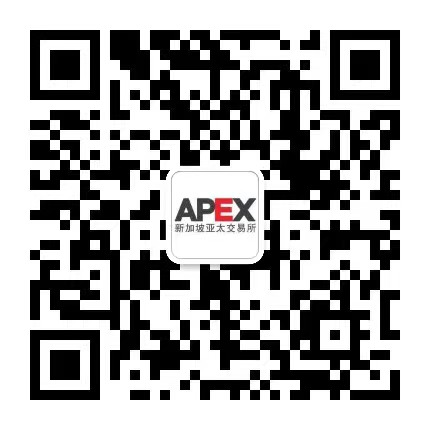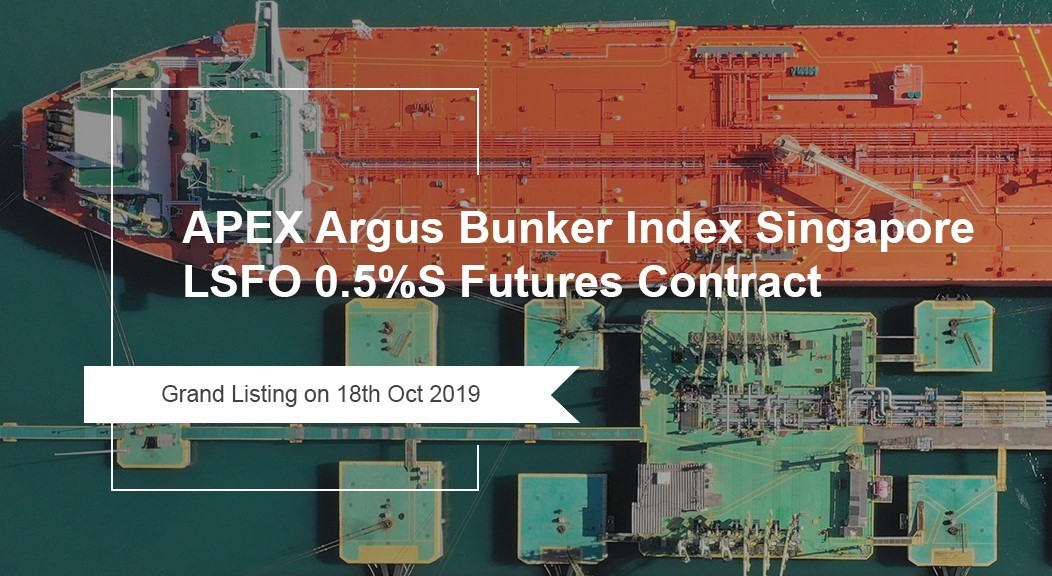
by APEX News | 2019-10-18

With the upcoming IMO2020 changes, Asia Pacific Exchange launched the APEX Argus Bunker Index (ABI) Singapore LSFO 0.5%S Futures Contract (“APEX ABI Singapore LSFO Futures”) on 18 Oct 2019. The first contract month to trade is December 2019, with a total of 12 consecutive monthly contracts listed.
When IMO2020 takes effect in January 2020, ships without scrubbers are required to use compliant bunker fuel with a Sulphur content of 0.5% or less, a reduction from the current 3.5%. Consequently, the marine fuels industry and shipping companies are facing a huge challenge hedging the price of this new fuel. The APEX ABI Singapore LSFO Futures shall be the first derivatives product worldwide that provides delivered bunker price trading and hedging for 0.5% Sulphur fuel. Given that no industry price benchmark for this fuel type was previously established, this new APEX product will provide market participants including ship owners with purchasing requirements and suppliers holding fuel inventory an instrument for accurate hedging. In addition, it may create opportunities for spread trading to crude and other refined oil markets.
Open positions at expiration will be cash settled. The final settlement price shall be the average of all available price assessments published by Argus Media for Singapore LSFO 0.5%S Bunker during the Contract Month.
ABI Singapore assessments were launched in June 2018 and are calculated using fixed price delivered-to-ship bunker transactions between suppliers and ship owners reported to Argus by 7pm each Singapore working day. More than 40 companies have voluntarily contributed trade data, making it a robust price assessment process.
The LSFO 0.5%S index represents the price of bunker fuel delivered between 4 and 12 days from the trade date, for volumes between 500t and 3,000t, with viscosity less than 380cst and Sulphur less than 0.5%. Argus will remove price outliers using a statistical analysis prior to calculating a Volume Weighted Average (VWA), representing the average price ship owners paid for fuel of that specification that day. The full assessment methodology can be viewed on the Argus website.
Argus is an independent media organization founded in 1970, with more than 1000 staff in 23 offices. Companies in 140 countries use Argus data to index physical trade, as benchmarks in financial derivative markets and for analysis and planning purposes.
Beside the new APEX ABI LSFO Futures, APEX had listed a physically deliverable Fuel Oil 380cst Futures Contract on 11th April 2019. So far, the daily average trading volume is around 23,000lots (230,000MT), and the daily average open interest is around 3,600 lots (36,000MT).
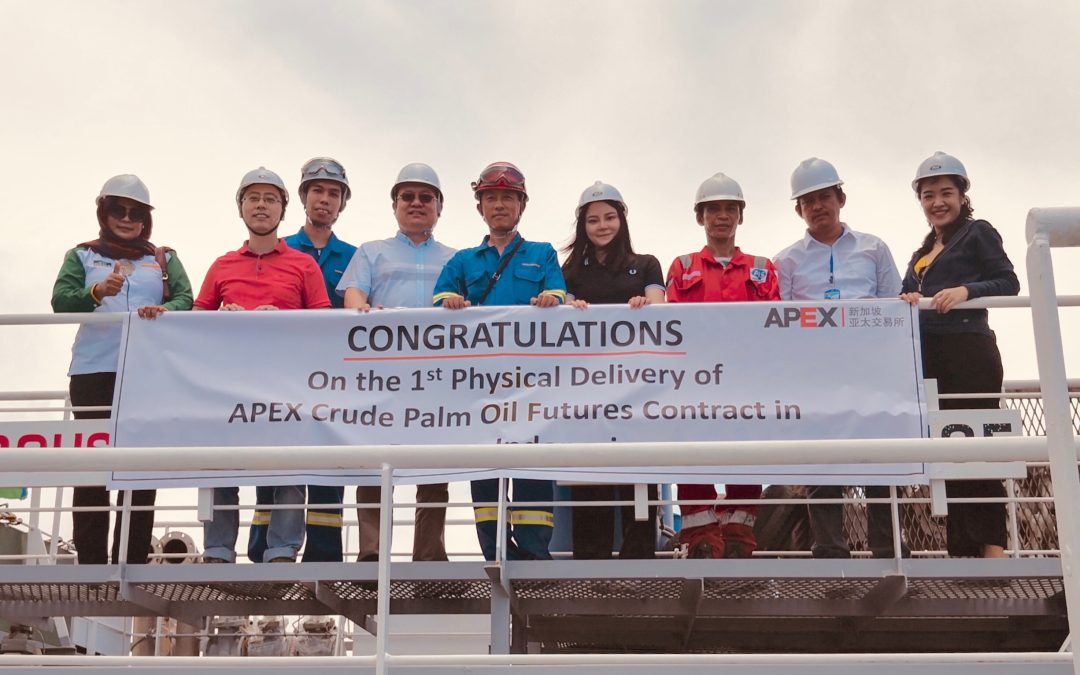
by APEX News | 2019-10-17
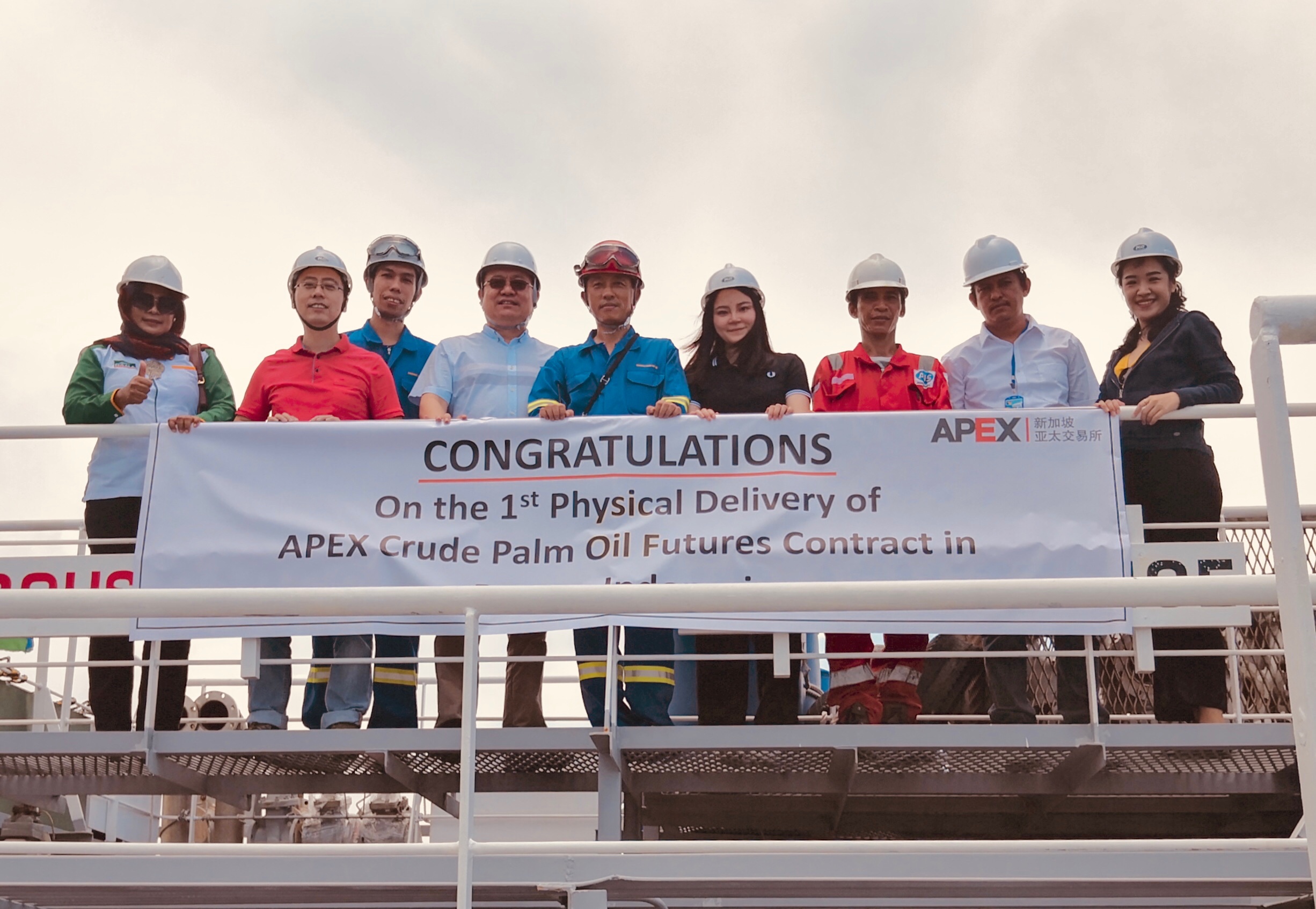
Singapore-based Asia Pacific Exchange (APEX) successfully completed the first physical delivery of APEX Crude Palm Oil Futures Contract on 17th October 2019. Total 7,000 metric tonnes of crude palm oil were loaded from Batam Port, Indonesia destinated to India. The smooth delivery was attributed to the close cooperation between AA Star, Sunfield, UOB Kay Hian and APEX.

The Crude Palm Oil Futures Contract is the fourth derivative product launched by APEX. Designed with a contract size of 10 metric tonnes, US-dollar denomination and FOB delivery terms, the product aims to address the needs of the physical market from the region as well as internationally, and provide more convenience and arbitrage opportunities to participants of the palm oil industry. Evidently, it has attracted strong interest from the market since its listing on 18th April 2019, with participants coming from palm oil plantation and commercial companies, international trading firms, proprietary/hedge funds and professional money managers. As of 30th September 2019, the average daily trade volume was 46,000 contracts and average daily trade value was USD$ 115 million. The product also sees its open interest grow steadily over the first five months of trading, reaching a high of 14,589 contracts. APEX expects to see more physical deliveries happening during the coming months.
Apart from Batam, Indonesia, APEX Crude Palm Oil Futures Contract has four delivery points along the Straits of Malacca, in Port Klang and Pasir Gudang in West Malaysia, Dumai and Belawan in Indonesia. In addition, there is also a delivery point in Lahad Datu in East Malaysia, where POIC Bulk Terminal Sdn Bhd was appointed as the independent Port Tank Installation (PTI) for APEX physical deliveries.
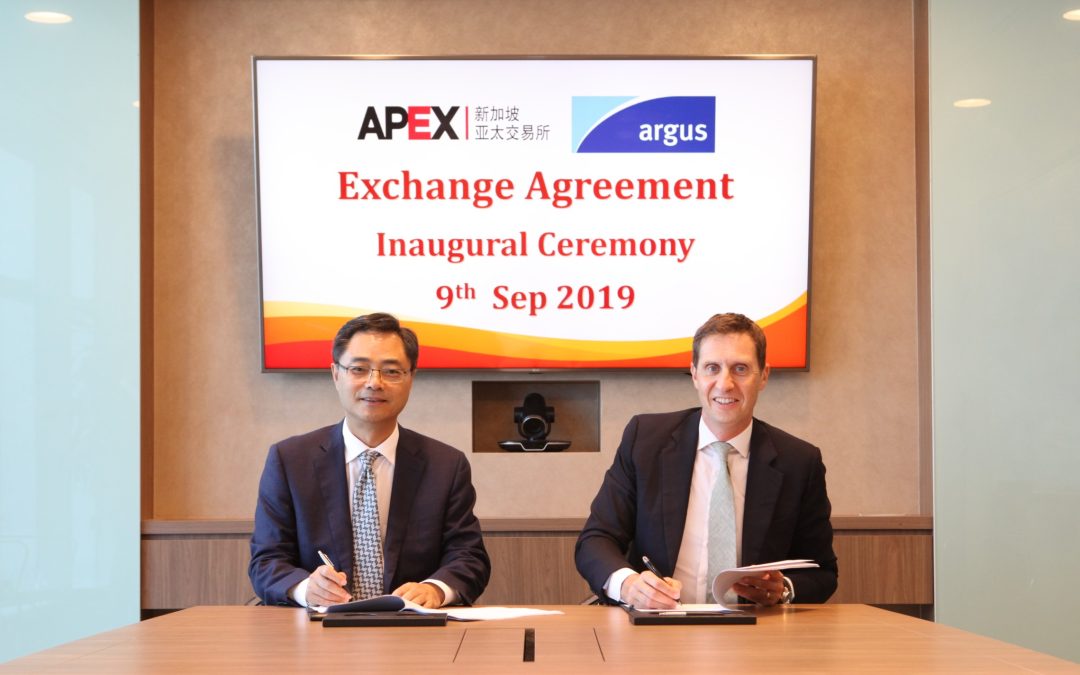
by APEX News | 2019-09-09
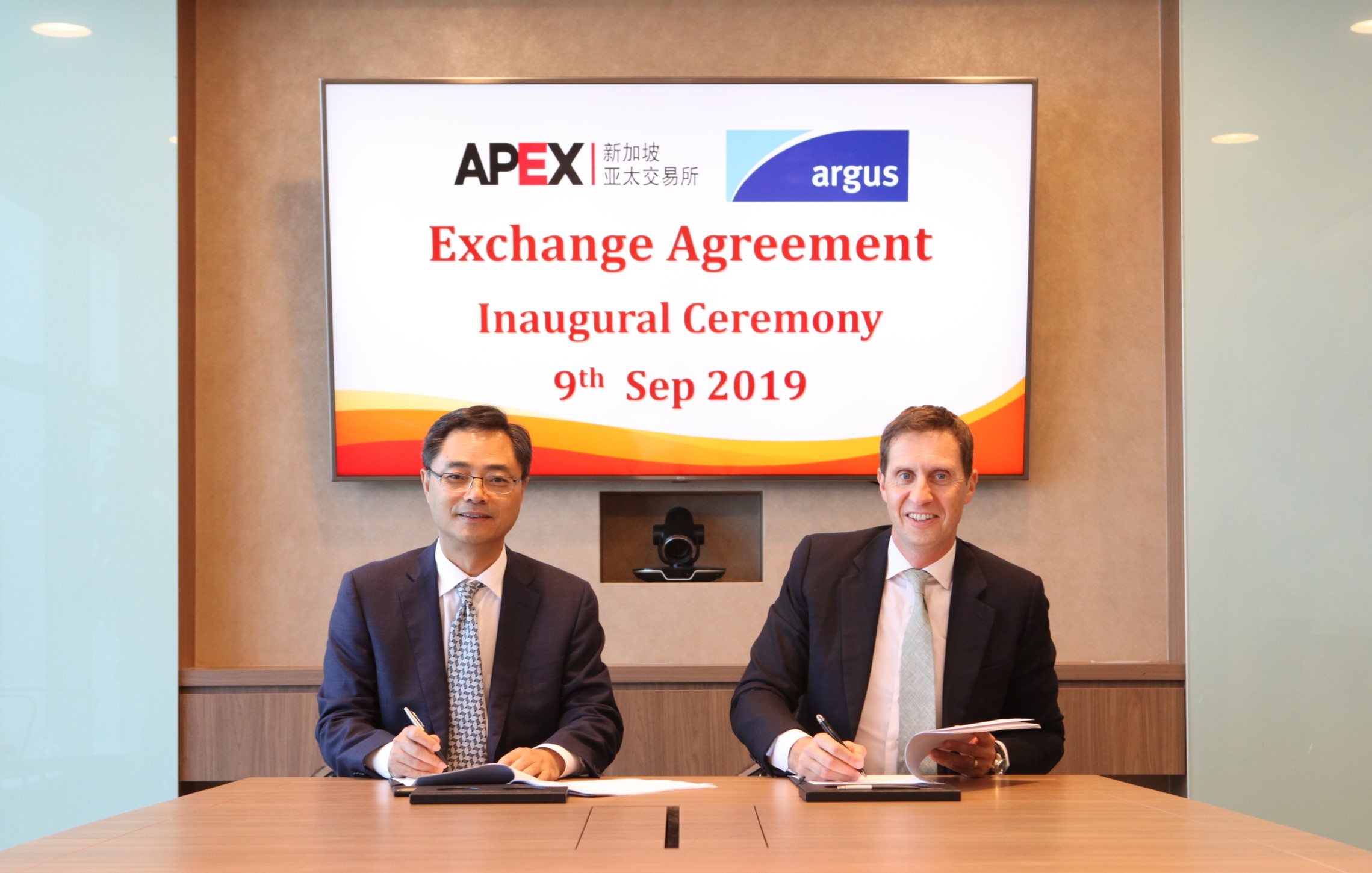
Global commodity price reporting and news agency Argus and the Asia Pacific Exchange (APEX) signed an agreement today licensing the use of the Argus Bunker Index (ABI) Singapore LSFO 0.5%S as the settlement price for a proposed new derivatives contract. The contract can be used by oil traders, bunker fuel suppliers and shipowners to manage their price risks related to the new low-sulphur fuel oil (LSFO) required to comply with the 0.5% sulphur cap being introduced by the International Maritime Organisation in January 2020 (IMO 2020).

ABI Singapore assessments were launched in June last year and are calculated using a volume-weighted average of fixed price delivered-to-ship bunker transactions between suppliers and shipowners reported to Argus by 7pm each day. More than 40 companies have voluntarily contributed their trade data over the previous year and typically more than 20 deals are submitted each day, making it a robust price assessment process. The LSFO 0.5%S index represents the price of bunker fuel delivered within 4-12 days from the trade date, for volumes between 500t and 3,000t, with viscosity of less than 380cst and sulphur below 0.5%.
The launch date and specifications for the APEX contract will be announced in due course, subject to the completion of the necessary regulatory processes. ABI Singapore assessments are available and published in the Argus Marine Fuels and the Argus Asia-Pacific Products reports.
“APEX is looking forward to partnering with Argus,” APEX chief executive Eugene Zhu said. “Since the launch of the High Sulphur Fuel Oil Futures Contract on 11 April 2019, the average daily trading volume and open interest have been increasing steadily. With the upcoming IMO 2020 regulations, the energy and shipping industries are expected to face greater challenges. To better fulfil market demands, APEX is working with Argus in our development of a Low Sulphur Fuel Oil Futures Contract, which will provide a new tool for market participants in order to hedge and manage their risks.”
“Argus is pleased to be working with our friends at APEX to provide this valuable trading and hedging instrument for use by the marine fuels industry,” Argus Media chairman and chief executive Adrian Binks said. “The bunker market in Singapore is already experiencing extreme volatility as we approach IMO 2020 and using ABI Singapore LSFO 0.5%S as a reference price in physical contracts and as a derivative trading instrument would help companies manage their price risk.”
About APEX
Asia Pacific Exchange-APEX, is an international derivatives exchange and clearing house approved by the Monetary Authority of Singapore, the third exchange with the “Approved Exchange” and “Approved Clearing House” licenses in Singapore. APEX’s business scope covers futures and options contracts covering both commodity and financial derivatives products, including derivative products in the asset classes of agriculture, energy, petrochemical, metal, foreign exchange, interest rates, bond and stock indices.
APEX officially launched its first product on 25 May 2018. Currently, the listed products include 380cst High Sulphur Fuel Oil Futures, Palm Olein Futures, Crude Palm Oil Futures and USD/CNH Futures.
About Argus Media
Argus is an independent media organisation with almost 1,000 staff. It is headquartered in London and has 23 offices in the world’s principal commodity trading and production centres. Argus produces price assessments and analysis of international energy and other commodity markets, and offers bespoke consulting services and industry-leading conferences.
Companies in 140 countries around the world use Argus data to index physical trade and as benchmarks in financial derivative markets as well as for analysis and planning purposes.
Argus was founded in 1970 and is a privately held UK-registered company. It is owned by employee shareholders and global growth equity firm General Atlantic.
ARGUS, the ARGUS logo, ARGUS MEDIA, ARGUS DIRECT, ARGUS OPEN MARKETS, AOM, FMB, DEWITT, JIM JORDAN & ASSOCIATES, JJ&A, FUNDALYTICS, METAL-PAGES, METALPRICES.COM, INTEGER, Argus publication titles and Argus index names are trademarks of Argus Media Limited.

by APEX News | 2019-08-06

On 6th August 2019, APEX successfully facilitated the first Exchange of Futures for Physicals (EFP) for the APEX Fuel Oil Futures Contract FO1909. A total of 3000 MT of 380cst Fuel Oil was transacted through the EFP facility, as part of APEX’s commitment to fulfil the different needs of the Fuel Oil Industry participants. Since its listing on 11th April 2019, the Average Daily Volume (ADV) has been around 26,000 lots (260,000MT) and Open Interest was around 5,500 lots (55,000 MT). The contract is a new hedging and investment tool for industrial players, such as Ship Owners, Fuel Oil suppliers, Refineries and traders.
As recent Fuel Oil spot prices experienced large fluctuations, Ocean Energy and a local trader engaged in the Exchange of Futures for Physical (EFP) of APEX380 Fuel Oil Futures Contract, converting 300 lots of FO1909 Contracts into 3000 MT of physical Fuel Oil. Subsequently, the Fuel Oil was sold to Sinopec Fuel Oil (Singapore) Pte Ltd.
APEX is the third exchange approved by the Monetary Authority of Singapore with the “Approved Exchange” and “Approved Clearing House” license. To date, APEX has four listed contracts, comprising of Energy, Agricultural and Financial products. In addition to EFP, the delivery methods of APEX contracts include the APEX Warehouse Receipt Delivery, FOB Delivery and cash settlement.
In light of the IMO2020 regulations, both the Energy and Shipping Industries are expected to face huge challenges from the potential volatility of Fuel Oil prices. In order to meet the market demand, APEX is planning to launch a Low Sulphur Fuel Oil (LSFO) Futures Contract. APEX is in the midst of discussions with major international oil companies and is expected to launch the contract in the near future.
EFP:
The Exchange of Futures for Physicals (“EFP“) shall refer to the procedure by which the Parties who hold the contracts of the same delivery month enter into a physicals sales and purchase agreement through negotiations, close their respective futures positions at the price described therein and exchange the payments and physicals of the corresponding quantities.
From the perspective of global market practice, EFP is commonly used among industrial participants, as it allows both parties to agree on the delivery terms, including: delivery location, quality specifications, date and time of delivery. Through the EFP method, both participants can expect to see a significant reduction in delivery cost.

by APEX News | 2019-07-06

Singapore-based Asia Pacific Exchange (APEX) has chosen Lahad Datu in Sabah as a delivery port for its Crude Palm Oil and RBD Palm Olein Futures Contracts, with the appointment of POIC Bulk Terminal Sdn Bhd as the independent Port Tank Installation (PTI) for cargoes to be physically delivered. The event was marked by an official ceremony held at Kota Kinabalu on the 21st May 2019, where Chief Minister of Sabah, YAB Datuk Seri Panglima Haji Mohd Shafie Bin Haji Apdal, witnessed the signing of a service agreement between POIC Bulk Terminal Sdn Bhd and APEX. This will make Lahad Datu the fifth delivery location for the contracts in addition to Port Klang and Pasir Gudang in West Malaysia, and Dumai and Belawan in Indonesia. With this new location, all commercial participants in East Malaysia, West Malaysia and Indonesia can take part in the sale and purchase of crude palm oil and palm olein, and this greatly expands the market coverage and depth so that more palm oil customers can enjoy the service of APEX. In addition to the delivery locations, APEX Crude Palm Oil and RBD Palm Olein Futures Contracts also have similar features such as 10 metric ton contract size and US-dollar denomination. This will not only address the needs of the physical market from around the region as well as internationally, but also provide more convenience and arbitrage opportunities to participants of the palm oil industry.






